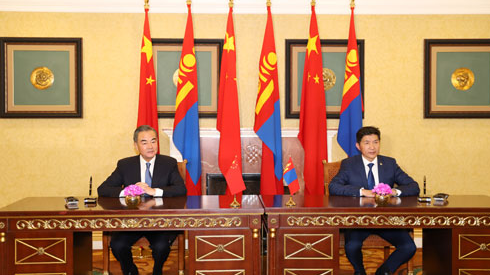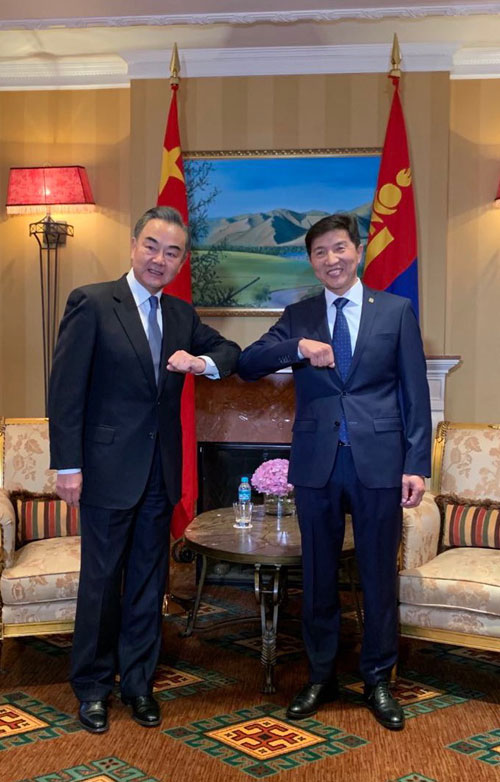China, Mongolia pledge to advance cooperation in epidemic response

Chinese State Councilor and Foreign Minister Wang Yi and Mongolian Foreign Minister Nyamtseren Enkhtaivan meet the press after talks in Ulan Bator, Mongolia, September 15, 2020. /Chinese Foreign Ministry
Anti-epidemic cooperation
Mongolian President Khaltmaa Battulga made a special visit to China at the most severe time of the epidemic in the country, expressed support for China and donated 30,000 sheep to China, Wang said, adding that Mongolian people from all walks of life initiated fundraising activities for China.
The Chinese side also reciprocated, by sharing prevention and control experience and information with Mongolia without reservation and providing assistance with medical supplies, Wang said, noting that the relationship between the two countries has withstood the test of the epidemic outbreak and has been further improved in the joint fight against the epidemic.
Wang said China is willing to further strengthen cooperation in the fight against the epidemic with Mongolia, consolidate the good momentum of "zero infection" on the two sides, and work together to prepare for the possible long-term presence of COVID-19.
He called on the two countries to strengthen normalized joint prevention and joint control, make better use of the "green channel" for goods exchanges, accelerate the establishment of "fast channels" for personnel exchanges and carry out vaccine and drug cooperation

Chinese State Councilor and Foreign Minister Wang Yi meets with Mongolian Foreign Minister Nyamtseren Enkhtaivan in Ulan Bator, Mongolia, September 15, 2020. /Chinese Foreign Ministry
Alignment of development strategies
During this visit, the two sides reached a consensus on extensive cooperation and agreed to speed up the alignment of the joint construction of the Belt and Road and Mongolia's Prairie Road development initiative.
The two sides agreed to actively promote sewage treatment plants, hydropower stations, transformation of shanty towns and other major projects that have been agreed and are under negotiation, expand the import of agricultural and animal husbandry products and coal from Mongolia, and further strengthen cooperation between ports and cross-border economic zones.
Wang said the two countries should continue to strengthen political mutual trust, consolidate the political foundation of bilateral relations, in particular respect each other's national sovereignty and territorial integrity, and refrain from interfering in each other's internal affairs. This is not only a political commitment when the two countries established diplomatic relations, but also a basic norm of international relations. It should become a "sacred needle" for the healthy and stable development of bilateral relations.
For his part, Enkhtaivan said that Mongolia attaches great importance to the development of relations with China and places cooperation with China as a priority in the country's foreign policy.
The establishment of a Green Gateway aimed at boosting trade and economic cooperation between Mongolia and China amid the COVID-19 epidemic has played an important role in restoring and expanding trade between the two countries, he said.
The Mongolian foreign minister said that Mongolia is willing to deepen cooperation with China in areas including culture, education, health and innovation, and intensify communication and coordination on the multilateral stage to promote more mutually beneficial and win-win results.
After the talks, the foreign ministers signed the revised Agreement on China-Mongolia Border Ports and Their Management System, the annual cooperation plan of the Chinese and Mongolian ministries of foreign affairs and other documents, and jointly met the press.


